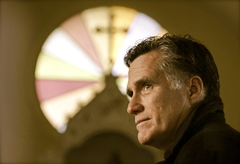Does the candidate believe that running for president is God's plan for him?
Referring to his fluid political positions, a number of commentators of late have been making statements to the effect that the only thing Mitt Romney seems to believe in is that he should be president. That got me thinking about how such a belief might have arisen, and how it might explain all the shifty flip-flopping we've seen over the course of the presidential campaign—and, in fact, the whole of Romney's political career.
Mormons believe that God has an individual plan for every one of us. This is not to say that they believe in predestination, an idea that would play havoc with their crucial belief in free will. Mormons instead believe in the doctrine of foreordination, in which God has specific tasks in mind for each of us to accomplish in this life, but with the actual accomplishment of them being dependent upon our own faith and diligence.

Another thing Mormons believe in is personal revelation. This means that if we have a problem or a question or a goal, we can turn to God in prayer after sincere consideration and ask for direction. God, we are told, will answer either by causing a confusion to come upon us that makes us forget the thing that is wrong or by affirming through a burning in the bosom that the thing is right. (See Doctrine & Covenants 9:7-9.) No good Latter-day Saint should undertake any major pursuit without having gone through this process of spiritual confirmation.
But this is a tricky doctrine. When I was growing up, I myself was able to convince myself that God approved of many different courses of action that probably weren't so good for me, simply by praying about them persistently and feverishly enough. And this is where Romney's belief that he should be president comes in. I have no doubt that, being a faithful Mormon and in fact a Mormon leader, he prayed long and hard about whether or not to pursue this office. The fact that he threw his hat so firmly into the ring is proof that he received his spiritual confirmation.
In other words, Romney must believe that running for president is what God wants him to do, that it is in fact God's plan for him. This belief could trump any need to have a detailed and specific policy plan. He'll say whatever it takes to get into office because that is where God needs him to be.
One of the great heroes of Mormonism is the Book of Mormon prophet Nephi (either a fictional character or a real human being, depending on your point of view on these things), who was charged by God with obtaining certain scriptural records from the keeping of a bad old fellow named Laban. God needed Nephi to get those records, and anything Nephi had to do to accomplish this was fine—up to an including lying and murder. (See The Book of Mormon, 1 Nephi 3 & 4, and specifically this passage.) (By the way, the same sort of anything-is-okay-because-I'm-righteous philosophy justifies every horrible action committed by another fictional character created by a prominent Mormon—Ender Wiggin of Ender's Game.)
Mormonism is steeped in this idea. What I really worry about, to get right down to it, is that Romney believes not only that God wants him to be president, but that there is some specific crisis coming which he is the only leader capable of meeting. It doesn't matter what this crisis may be. Mitt himself probably has no inkling yet of that. But when the time comes he will recognize it, or will think he does, and he will do what he thinks God wills.
That's what really scares me—that where Mitt Romney himself may have no plan, his God surely does. And there's no way for us as voters to know what that may turn out to be.


When I first read this, I thought it was intriguing, but I wasn't so sure about it. As the election got closer, arrived, and then we heard about how certain Romney had been, I decided you nailed it.
I'd go a step further and claim that Romney's Mormon background influenced how he ran his campaign. We're familiar with "Lying for the Lord", where being completely truthful is subservient to furthering the will of God. We're also familiar with milk before meat, the pervasive notion that we cannot let the uninitiated in on the more complete understanding.
I was surprised in Romney's concession speech when he stressed the important principles of honesty and integrity. I recognize that making promises they can't or don't keep is a standard part of politics. However, Romney was unusually mendacious, saying whatever he thought people wanted to hear at a given time. He veered hard right during the primaries. He ambushed Obama in the first debate by veering back to the center. He seemed unconcerned by any guiding principles, unconcerned that what he said at one time contradicted what he said previously or had a factual basis. I suspect that Mitt still feels like he is honest -- he isn't lying or flip-flopping, rather he is staying true to his core principle, that he should be president. The rest are just irrelevant details, subservient to that bedrock conviction. Honesty and integrity mean staying true to his core convictions; all the rest are just means to an end.
Romney's campaign was also notable for his commitment to his economic plan, which would solve all our problems, yet he would not share the details. He expressed a concern that if he revealed the details he would be attacked for them. This reminds me of Mormonism's "milk before meat" -- only reveal the milk, the easy stuff, the outline, until the people are fully committed. Similarly, he refused to divulge his tax returns because they would be used to attack him.